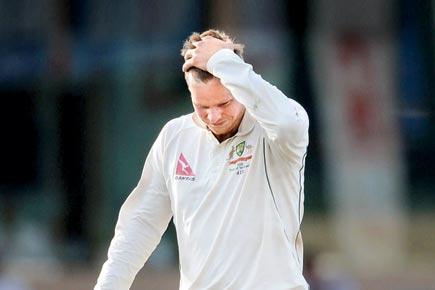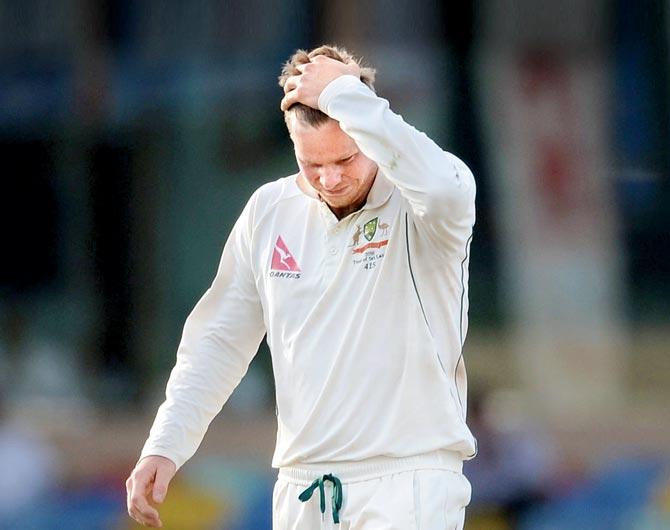For a cricketing nation that took pride in their players’ grit, Steven Smith-led Australia’s lack of will against South Africans was shocking


Australia captain Steven Smith, who is enduring a rough period in which the men from Down Under have lost five consecutive Test matches. Pic/AFP
ADVERTISEMENT
 When was the last time Australia lost five or more Tests in a row before 2016 and 2013? It’s probably an apt one for Channel 9’s regular trivia question in the next Test against South Africa at Adelaide.
When was the last time Australia lost five or more Tests in a row before 2016 and 2013? It’s probably an apt one for Channel 9’s regular trivia question in the next Test against South Africa at Adelaide.
However, there is nothing trivial about the numbers connected to Australia’s run of shame — three Test losses in Sri Lanka, five ODI defeats in South Africa and now two in two Tests against the Proteas.
Steven Smith was not coy to read out the riot act in Hobart on Tuesday. He had every reason to do so. One part of his post-match utterances was striking, if not surprising. “We’re not digging in enough, we’re not having the pride in our wicket,” said the despondent young captain with a look-what-they’ve-got-me-into expression on his face. For a cricketing nation that has prided itself on grit, guts and gumption, this was no sweet music to a cricket lover’s ear.
Smith had not finished. “Something’s got to change and we’ve got to play a lot better than we have been if we’re going to beat any opposition around the world at the moment. I need players that are willing to get in the contest and get in the battle and have some pride in playing for Australia and pride in the baggy green (cap).
“I’m quite sick of saying it. We’ve lost five times in a row and for an Australian cricket team that’s humiliating and I’m embarrassed to be sitting here in this position, to be honest with you,” he added. This was the captain of Australia telling stakeholders of the game that his troops lacked determination. This was an Australian whose cricketing set-up produced players of such fortitude that Ian Wooldridge, the great British sports writer was moved to call adhesive opening batsman Bill Lawry a ‘corpse with pads on.’ The same Lawry was so ruthless and driven that when a teammate asked him what they should do since the Brabourne Stadium was in flames due to a riot caused by the dismissal of India’s tailend batsman S Venkataraghavan in 1969-70, he replied, “Hell, we need a wicket badly.”
Smith’s grossly under-performing men are a poor reflection on Australia’s much-hailed domestic set-up. Or is it that the selectors have not backed the right men for baggy green honours? Extremely worrying is the fact that not many young batsmen are emerging from the stables which once produced players of high pedigree.
Is the present lot hungry? Are they scared enough of losing their place in the team? In 2003, while waiting for the India vs Australia Test series to begin, a cricket expert in Brisbane told me that he learnt about what the then opening pair of Matthew Hayden and Justin Langer kept reminding each other when they slipped: “Remember, how we have worked our butts off to get back in this team. We can’t give it away.”
For years, Australian cricketers have taken delight in the foibles and frailties of other teams. Times have changed, and I’m sure some of the Indian players would be wishing they were Down Under to exploit those big holes in Australian cricket. Ditto the Englishmen who will be there next year for the Ashes.
South African golden great Graeme Pollock, who spoke to me on Tuesday night from Johannesburg, was convinced he has not seen an Australian side as poor as the current one. Pollock was part of that South African team which whitewashed Australia 4-0 in 1969-70. “This is the worst Australian team I’ve seen. They are badly out of touch and have a lot of work to do. I don’t see an improvement soon. The way they handled the moving ball in Hobart was shocking.”
In Australia’s hour of gloom, we must not forget to sing South Africa’s praises. Here’s a team that won two Tests in a row in the face of adversity caused by the absence of some key players — primarily, destructive batsman and regular captain AB de Villiers, redoubtable pacers Dale Steyn and Morne Morkel. As Pollock says, “It’s a side which has good, positive vibes around it.”
Before we conclude, let’s revisit that trivia question. The answer is 1984, when Kim Hughes’ Australia lost six consecutive games to Clive Lloyd’s all-conquering West Indies. Allan Border, who was made captain after five of those losses, is not calling for current skipper Smith’s head. Border is a particularly good supporter to have. Not only has he walked Smith’s rough path, he is also a prophet of cricketing persistence.
And persistence is just what the Aussies need to get back on track.
mid-day’s group sports editor Clayton Murzello is a purist with an open stance. He tweets @ClaytonMurzello. Send your feedback to mailbag@mid-day.com
 Subscribe today by clicking the link and stay updated with the latest news!" Click here!
Subscribe today by clicking the link and stay updated with the latest news!" Click here!






